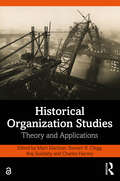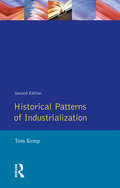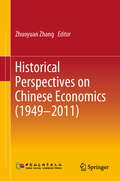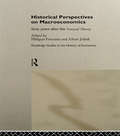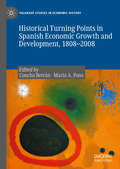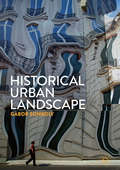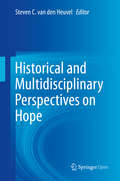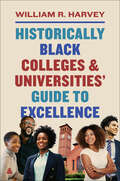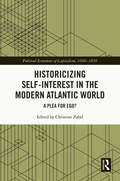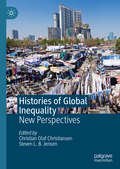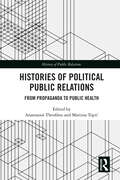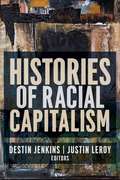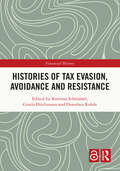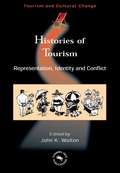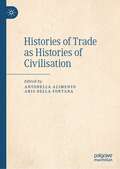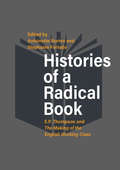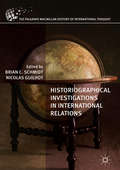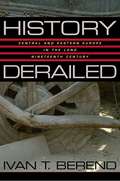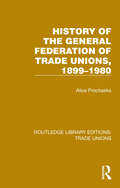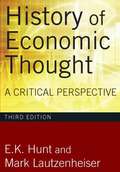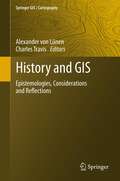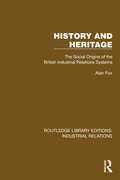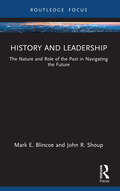- Table View
- List View
Historical Legacies of Communism in Russia and Eastern Europe
by Stephen Kotkin Mark R. BeissingerThis book takes stock of arguments about the historical legacies of communism that have become common within the study of Russia and East Europe more than two decades after communism's demise and elaborates an empirical approach to the study of historical legacies revolving around relationships and mechanisms rather than correlation and outward similarities. Eleven essays by a distinguished group of scholars assess whether post-communist developments in specific areas continue to be shaped by the experience of communism or, alternatively, by fundamental divergences produced before or after communism. Chapters deal with the variable impact of the communist experience on post-communist societies in such areas as regime trajectories and democratic political values; patterns of regional and sectoral economic development; property ownership within the energy sector; the functioning of the executive branch of government, the police, and courts; the relationship of religion to the state; government language policies; and informal relationships and practices.
Historical Organization Studies: Theory and Applications
by Mairi Maclean, Stewart R. Clegg, Roy Suddaby and Charles HarveyWe are now entering a new phase in the establishment of historical organization studies as a distinctive methodological paradigm within the broad field of organization studies. This book serves both as a landmark in the development of the field and as a key reference tool for researchers and students. For two decades, organization theorists have emphasized the need for more and better research recognizing the importance of the past in shaping the present and future. By historicizing organizational research, the contexts and forces bearing upon organizations will be more fully recognized, and analyses of organizational dynamics improved. But how, precisely, might a traditionally empirically oriented discipline such as history be incorporated into a theoretically oriented discipline such as organization studies? This book evaluates the current state of play, advances it and identifies the possibilities the new emergent field offers for the future. In addition to providing an important work of reference on the subject for researchers, the book can be used to introduce management and organizational history to a student audience at both undergraduate and postgraduate levels. The book is a valuable source for wider reading, providing rich reference material in tutorials across organizational studies, or as recommended or required reading on courses with a connection to business or management history.
Historical Patterns of Industrialization
by Tom KempIndustrialization is still the factor that distinguishes the modern world from the past, and advanced countries from undeveloped ones. In this revised and expanded edition, Tom Kemp uses the historical record of industrialization to explore key questions about its impact and the significance we assign to it. The book adopts a thematic approach to examine the roles of technology, banking, transport and the state; the fate of the peasantry in an industrializing society; and the changing features of industrial capitalism in the latter part of the 19th century. It features four contrasted case studies from outside Europe - India, Canada, Japan and, for the first time in this second edition, South Africa. It is aimed at 1st year University/Polytechnic students and is suitable for courses in economic history, social history, development studies, applied economics, international economics and area studies.
Historical Perspectives on Chinese Economics (1949–2011)
by Zhuoyuan ZhangThe book summarizes the 60 year development of economic theories, explaining in detail the features and development of economic theories from 1949 to 1976 and in the reform and opening-up period. The author has made a systematic theoretical analysis on the economic situation from two different stages — before and after China's reform and opening-up, which put forward many unconventional point of view, and it has contributed visionary ideas for the research on China's economy. It provide the readers with a general understanding of the economic trend and development of contemporary China, with many pertinent answer to the practical and concrete problems about China's economy.
Historical Perspectives on Macroeconomics: Sixty Years After the 'General Theory' (Routledge Studies in the History of Economics)
by Philippe Fontaine Albert JolinkSince the publication of Keynes's General Theory of Employment, Interest and Money in 1936, macroeconomic theory has altered considerably. Each author in this volume focuses on an issue which either preceded, accompanied or followed the 'Keynesian Revolution' and helped to shape economics in subsequent years. Contributors reconsider some of the major concepts of the "General Theory": unemployment and the identity of income and output. They also highlight some of the controversies in macroeconomic theory and review the macroeconomic policy implications and consequences.
Historical Perspectives on Modern Economics: The Viennese Students of Civilization
by Erwin DekkerThis book argues that the work of the Austrian economists, including Carl Menger, Joseph Schumpeter, Ludwig von Mises and Friedrich Hayek, has been too narrowly interpreted. Through a study of Viennese politics and culture, it demonstrates that the project they were engaged in was much broader: the study and defense of a liberal civilization. Erwin Dekker shows the importance of the civilization in their work and how they conceptualized their own responsibilities toward that civilization, which was attacked left and right during the interwar period. Dekker argues that what differentiates their position is that they thought of themselves primarily as students of that civilization rather than as social scientists, or engineers. This unique focus and approach is related to the Viennese setting of the circles, which constitute the heart of Viennese intellectual life in the interwar period.
Historical Turning Points in Spanish Economic Growth and Development, 1808–2008 (Palgrave Studies in Economic History)
by Concha Betrán María A. PonsThis book analyses the main historical turning points in the Spanish economy and the related challenges it faced. It focuses on six turning points that changed the direction of the Spanish economy, and identifies the economic, social or political origin of these watersheds. It also compares the Spanish trajectory with the international one, exploring the macroeconomic context in which these turning points happened, as well as the external and internal constraints on domestic political choices for a small country like Spain. The book focuses on how Spain faced up to each turning point, the reforms that were implemented, the differences between the Spanish response and that of other countries, the results of the policies enacted and what problems were not tackled. This is an interesting and unique perspective as most of the turning points in economic history are generally studies from the viewpoint of core countries such as the UK, US or Germany. The ultimate objective is to learn useful lessons from Spanish economic history in order to better face future turning points.
Historical Urban Landscape
by Gábor SonkolyThis book uses the Historic Urban Landscape - the most recently codified notion of international urban heritage conservation - to demonstrate why it is necessary to demarcate history from cultural heritage and what consequences the increasing popularity of the latter have on history. It also demonstrates how the history of cultural heritage can be constructed as a historical problem. First, the conceptual history of urban heritage preservation - based on the standard setting instruments of international organizations - reveals the fundamental elements of the current concept of urban heritage. Second, this concept, as worded in the HUL approach, is investigated through the analysis of Vienna, which played a crucial role in the establishment of HUL. These examples are used to to show how the evolution of cultural heritage can be constructed as a historical problem.
Historical and Multidisciplinary Perspectives on Hope
by Steven C. van den HeuvelThis open access volume makes an important contribution to the ongoing research on hope theory by combining insights from both its long history and its increasing multi-disciplinarity. In the first part, it recognizes the importance of the centuries-old reflection on hope by offering historical perspectives and tracing it back to ancient Greek philosophy. At the same time, it provides novel perspectives on often-overlooked historical theories and developments and challenges established views. The second part of the volume documents the state of the art of current research in hope across eight disciplines, which are philosophy, theology, psychology, economy, sociology, health studies, ecology, and development studies. Taken together, this volume provides an integrated view on hope as a multi-faced phenomenon. It contributes to the further understanding of hope as an essential human capacity, with the possibility of transforming our human societies.
Historically Black Colleges and Universities' Guide to Excellence
by Dr. William R. HarveyFrom the esteemed President of Hampton University, an insider account that reveals the secret to HBCU graduates’ remarkable success—a distinguished honor roll which includes Vice President Kamala Harris, Dr. Martin Luther King Jr., Oprah Winfrey, Zora Neale Hurston, Toni Morrison, Ruth Carter, Ta-Nehisi Coates, and many others.In his more-than-four-decade tenure as the President of Hampton University—one of 107 Historically Black Colleges and Universities in America—Dr. William R. Harvey has been a champion of the cultural impact and value of HBCUs, demonstrated by the achievements of their numerous notable alumni. Their success is no coincidence. It is the result of a faultless formula that sets HBCUs apart and helps their students thrive—a formula built on core tenets, including displaying moral and wholesome values at all times, continuously pursuing character growth, and embracing communal responsibilities whenever possible.The mission of Dr. Harvey is to represent Blackness to its highest degree at every opportunity. He is a passionate believer in the remarkability of the Black diaspora in all its complexity and beauty. That conviction drives the timeless lessons he’s adhered to and has instilled in his students: the power of dress to establish respect; the importance of integrity; financial accountability; reverence for elders. It is these tried-and-true lessons and others that have uniquely prepared and propelled HBCU students to success for generations. The Historically Black Colleges and Universities' Guide to Excellence is a thoughtful and knowledgeable account of what it truly takes to successfully navigate a white world as a Black person while retaining one’s core Blackness. Practical and proven, it lays the groundwork for individual and communal Black prosperity.
Historicizing Self-Interest in the Modern Atlantic World: A Plea for Ego? (Political Economies of Capitalism, 1600-1850)
by Christine ZabelThis volume historicizes the use of the notion of self-interest that at least since Bernard de Mandeville and Adam Smith’s theories is considered a central component of economic theory. Having in the twentieth century become one of the key-features of rational choice models, and thus is seen as an idealized trait of human behavior, self-interest has, despite Albert O. Hirschman’s pivotal analysis of self-interest, only marginally been historicized. A historicization(s) of self-interest, however, offers new insights into the concept by asking why, when, for what reason and in which contexts the notion was discussed or referred to, how it was employed by contemporaries, and how the different usages developed and changed over time. This helps us to appreciate the various transformations in the perception of the notion, and also to explore how and in what ways different people at different times and in different regions reflected on or realized the act of considering what was in their best interest. The volume focuses on those different usages, knowledges, and practices concerned with self-interest in the modern Atlantic World from the seventeenth to twentieth centuries, by using different approaches, including political and economic theory, actuarial science, anthropology, or the history of emotions. Offering a new perspective on a key component of Western capitalism, this is the ideal resource for researches and scholars of intellectual, political and economic history in the modern Atlantic World.
Histories of Global Inequality: New Perspectives
by Christian Olaf Christiansen Steven L. B. JensenThis book argues that inequality is not just about numbers, but is also about lived, historical experience. It supplements economic research and offers a comprehensive stocktaking of existing thinking on global inequality and its historical development. The book is interdisciplinary, drawing upon regional and national perspectives from around the world while seeking to capture the multidimensionality and multi-causality of global inequalities. Grappling with what economics offers – as well as its blind spots – the study focuses on some of today’s most relevant and pressing themes: discrimination and human rights, defences and critiques of inequality in history, decolonization, international organizations, gender theory, the history of quantification of inequality and the history of economic thought. The historical case studies featured respond to the need for wider historical research and to calls to examine global inequality in a more holistic manner.The Introduction 'Chapter 1 Histories of Global Inequality: Introduction' is open access under a CC BY 4.0 license via link.springer.com.
Histories of Political Public Relations: From Propaganda to Public Health (The History of Public Relations)
by Anastasios Theofilou Martina TopićDespite strong arguments that have been exploring the influence of Public Relations (PR) on public information, propaganda, the development of nation branding and policy-making, there remains little research on the history of governmental PR. This has led to a limited understanding of the discipline that aligns it with a supportive role to wider marketing campaigns or with a stretch to political communication through lobbying.Responding to this challenge, this book explores PR’s historical connection to government communication. The editors assemble respected contributors to explore government PR through a series of micro-histories and also examine larger theoretical issues, including the relationship between PR and propaganda. The chapters explore behavioural aspects of government campaigning and the tools and techniques typically used. In the context of COVID-19 and global resistance to measures, while health and climate scientists warn that there might be more pandemics to come, looking at behavioural campaigning becomes even more relevant.This book will add knowledge and understanding to the fields of PR history and historiography. Academics and researchers will find the volume appropriate for research and teaching.
Histories of Racial Capitalism (Columbia Studies in the History of U.S. Capitalism)
by Jenkins, Destin; Leroy, JustinThe relationship between race and capitalism is one of the most enduring and controversial historical debates. The concept of racial capitalism offers a way out of this impasse. Racial capitalism is not simply a permutation, phase, or stage in the larger history of capitalism—since the beginning of the Atlantic slave trade and the colonization of the Americas, capitalism, in both material and ideological senses, has been racial, deriving social and economic value from racial classification and stratification. Although Cedric J. Robinson popularized the term, racial capitalism has remained undertheorized for nearly four decades.Histories of Racial Capitalism brings together for the first time distinguished and rising scholars to consider the utility of the concept across historical settings. These scholars offer dynamic accounts of the relationship between social relations of exploitation and the racial terms through which they were organized, justified, and contested. Deploying an eclectic array of methods, their works range from indigenous mortgage foreclosures to the legacies of Atlantic-world maroons, from imperial expansion in the continental United States and beyond to the racial politics of municipal debt in the New South, from the ethical complexities of Latinx banking to the postcolonial dilemmas of extraction in the Caribbean. Throughout, the contributors consider and challenge how some claims about the history and nature of capitalism are universalized while others remain marginalized. By theorizing and testing the concept of racial capitalism in different historical circumstances, this book shows its analytical and political power for today’s scholars and activists.
Histories of Tax Evasion, Avoidance and Resistance (Financial History #36)
by Dorothea Rohde Gisela HürlimannTax evasion, tax avoidance and tax resistance are widespread phenomena in political, economic, social and fiscal history from antiquity through medieval, early modern and modern times. This book shows how different groups and individuals around the globe have succeeded or failed in not paying their due taxes, whether in kind or in cash, on their properties or on their crops. It analyses how, throughout history, wealthy and poor taxpayers have tried to avoid or reduce their tax burden by negotiating with tax authorities, through practices of legal or illegal tax evasion, by filing lawsuits, seeking armed resistance or by migration, and how state authorities have dealt with such acts of claim making, defiance, open resistance or elusion. It fills an important research gap in tax history, addressing questions of tax morale and fairness, and how social and political inequality was negotiated through taxation. It gives rich insights into the development of citizen-state relationships throughout the course of history. The book comprises case studies from Ancient Athens, Roman Egypt, Medieval Europe, Early Modern Mexico, the Ottoman Empire, Nigeria under British colonial rule, the United Kingdom of the early 20th century, Greece during the Second World War, as well as West Germany, Switzerland, Sweden and the United States in the 20th century, including transnational entanglements in the world of late-modern offshore finance and taxation. The authors are experts in fiscal, economic, financial, legal, social and/or cultural history. The book is intended for students, researchers and scholars of economic and financial history, social and world history and political economy.
Histories of Tourism
by John K. WaltonThis collection of essays develops the historical dimension to tourism studies through thematic case studies. The editor's introduction argues for the importance of a closer relationship between history and tourism studies, and an international team of contributors explores the relationships between tourism, representations, environments and identities in settings ranging from the global to the local, from the Roman Empire to the twentieth century, and from Frinton to the 'Far East'.
Histories of Trade as Histories of Civilisation
by Antonella Alimento Aris Della FontanaThis edited collection explores the histories of trade, a peculiar literary genre that emerged in the context of the historiographical and cultural changes promoted by the histoire philosophique movement. It marked a discontinuity with erudition and antiquarianism, and interacted critically with universal history. By comparing and linking the histories of individual peoples within a common historical process, this genre enriched the reflection on civilisation that emerged during the long eighteenth century. Those who looked to the past wanted to understand the political constitutions and manners most appropriate to commerce, and grasp the recurring mechanisms underlying economic development. In this sense, histories of trade constituted a declination of eighteenth-century political economy, and thus became an invaluable analytical and practical tool for a galaxy of academic scholars, journalists, lawyers, administrators, diplomats and government ministers whose ambition was to reform the political, social and economic structure of their nations. Moreover, thanks to these investigations, a lucid awareness of historical temporality and, more particularly, the irrepressible precariousness of economic hegemonies, developed. However, as a field of tension in which multiple and even divergent intellectual sensibilities met, this literary genre also found space for critical assessments that focused on the ambivalence and dangers of commercial civilisation. Examining the complex relationship between the production of wealth and civilisation, this book provides unique insights for scholars of political economy, intellectual history and economic history.
Histories of a Radical Book: E. P. Thompson and <em>The Making of the English Working Class</em>
by Antoinette Burton and Stephanie FortadoFor better or worse, E.P. Thompson’s monumental book The Making of the English Working Class has played an essential role in shaping the intellectual lives of generations of readers since its original publication in 1963. This collected volume explores the complex impact of Thompson’s book, both as an intellectual project and material object, relating it to the social and cultural history of the book form itself—an enduring artifact of English history.
Historiographical Investigations in International Relations (The Palgrave Macmillan History of International Thought)
by Nicolas Guilhot Brian C. SchmidtThis book critically investigates the historiography of International Relations. For the past fifteen years, the field has witnessed the development of a strong interest in the history of the discipline. The chapters in this edited volume, written by some of the field’s preeminent disciplinary historians, all manifest the best of an innovative and exciting generation of scholarship on the history of the discipline of International Relations. One of the objectives of this volume is to take stock of the historical turn. Yet this volume is not simply a stock-taking exercise, as it also intends to identify the limitations and blind spots of the recent historiographical literature. The chapters consider a range of diverse thinkers and examine their impact on understanding various dimensions of the field’s history.
History Derailed: Central And Eastern Europe In The Long Nineteenth Century
by Ivan Berend"I do not think it possible to understand the troubles and instabilities of Central and Eastern Europe today without reading Ivan T.Berend, the finest comparative historian of this region. In History Derailed, he has produced a characteristically lucid and masterly synthesis of its economic, social, political and cultural history in the 'long nineteenth century' which every reader of his much admired study of inter-war Central and Eastern Europe, Decades of Crisis, will need to read, and anyone interested in the continuing problems of the region will want to read."—Eric J. Hobsbawm, Emeritus Professor of Economic and Social History at the University of London and author of many histories including The Age of Extremes: A History of the World, 1914-1991 "This multi-faceted and lavishly illustrated analytical history of Central-East Europe before World War I, written by the world’s foremost scholar of the region, explains how and why the paths of modernization and development diverged so markedly between East and West Europe. Ivan T. Berend’s tour de force of historical interpretation must be essential reading for anyone seeking a true perspective on modern Europe."—Derek H. Aldcroft, University Fellow in the Department of Economic & Social Science, University of Leicester
History General Federation Trade Unions, 1899-1980 (Routledge Library Editions: Trade Unions #18)
by Alice ProchaskaWhen this book was originally published in 1982 the General Federation of Trade Unions (GFTU) was an organisation which catered for some 40 unions with an aggregate membership of 490,000. The GFTU in the late 20th Century was a very different organisation from what its founders in 1899 hope it might become, but in both its early and later form, it holds a significant place in the history of British trade unionism. Its history, outlined in this book sheds much light on the history of labour relations and working-class organisation in this country as a whole. The book provides a framework within which the GFTU’s contribution to the history of British labour in the 20th Century may be understood.
History Of Economic Thought: A Critical Perspective
by E. K. Hunt Mark LautzenheiserThe new edition of this classroom classic retains the organizing theme of the original text, presenting the development of thought within the context of economic history. Economic ideas are framed in terms of the spheres of production and circulation, with a critical analysis of how past theorists presented their ideas.
History and GIS: Epistemologies, Considerations and Reflections
by Alexander Von Lünen Charles TravisGeographical Information Systems (GIS) - either as "standard" GIS or custom made Historical GIS (HGIS) - have become quite popular in some historical sub-disciplines, such as Economic and Social History or Historical Geography. "Mainstream" history, however, seems to be rather unaffected by this trend. More generally speaking: Why is it that computer applications in general have failed to make much headway in history departments, despite the first steps being undertaken a good forty years ago? With the "spatial turn" in full swing in the humanities, and many historians dealing with spatial and geographical questions, one would think GIS would be welcomed with open arms. Yet there seems to be no general anticipation by historians of employing GIS as a research tool. As mentioned, HGIS are popular chiefly among Historical Geographers and Social and Economic Historians. The latter disciplines seem to be predestined to use such software through the widespread quantitative methodology these disciplines have employed traditionally. Other historical sub-disciplines, such as Ancient History, are also very open to this emerging technology since the scarcity of written sources in this field can be mitigated by inferences made from an HGIS that has archaeological data stored in it, for example. In most of Modern History, however, the use of GIS is rarely seen. The intellectual benefit that a GIS may bring about seems not be apparent to scholars from this sub-discipline (and others). This book wants to investigate and discuss this controversy. Why does the wider historian community not embrace GIS more readily? While one cannot deny that the methodologies linked with a GIS follow geographical paradigms rather than historical ones, the potential of GIS as a 'killer application' for digital historical scholarship should be obvious. This book brings together authors from Geography and History to discuss the value of GIS for historical research. The focus, however, will not be on the "how", but on the "why" of GIS in history.
History and Heritage: The Social Origins of the British Industrial Relations Systems (Routledge Library Editions: Industrial Relations)
by Alan FoxHistory and Heritage (1985) offers the first comprehensive exploration and assessment of the historical developments that form Britain’s industrial relations system – its institutions, texture and place in wider society. It looks at pre-industrial patterns of thought and behaviour, at religious and political struggles, different strategies of rule and social control, and at the central significance of the ruling order’s conditional commitment to the rule of law and certain liberal freedoms.
History and Leadership: The Nature and Role of the Past in Navigating the Future (Leadership Horizons)
by John R. Shoup Mark E. BlincoeLeaders and managers are rightly tasked to take their organizations and communities to a desired future. They are expected to be forward looking with compelling vision statements. As a result, they are often too busy in the present managing the future to be bothered with the past. Yet it is organizational histories that provide the contexts and clues for the future. History and Leadership: The Nature and Role of the Past in Navigating the Future demonstrates that intentional historical perspective-taking provides a sort-of wisdom for doing business in the present and future and equips leaders to leverage the past to help their organizations thrive. This book appeals to several audiences. It will serve as a supplementary text for undergraduate and graduate students in both the humanities and leadership studies. The book also appeals to practicing leaders and managers who wish to develop their emotional, cultural, and social intelligence by exploring perennial issues and lessons found in well-developed histories. This book also serves as a stand-alone read for a range of professionals who want a more recreational and non-traditional read on history and leadership. The book cultivates an appreciation for history and equips readers to be connoisseurs of history for the betterment of themselves and society.

